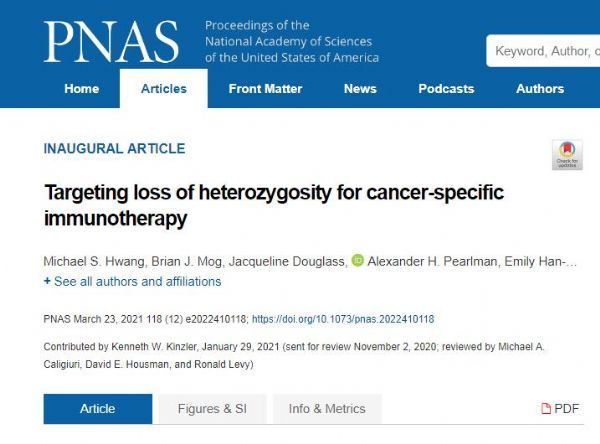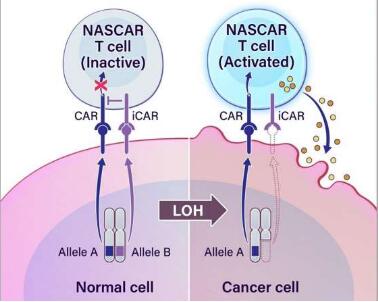Recently, an international journal published in PNAS, entitled "Targeting loss of heterozygosity for cancer - specific immunotherapy" research report, the Johns Hopkins university school of medicine of institutions such as scientists have developed a new type of cancer immunotherapy prototype, or it could effect on T cell engineering modification to target all common genetic variation in cancer (based alteration); The new method stimulates the body's immune response to defend against cells that are missing one copy of the gene, known as loss of heterozygosity (LOH).

A gene has two alleles, or copies, from each parent; Cancer - related genetic changes usually involve the loss of one copy of the gene. This copy loss, or LOH, is the most common genetic event in cancer development, according to researcher Kenneth Kinzler, PhD. New cancer immunotherapies often turn missing copies of genes back into immune cell activation signals. Although historically a marker of cancer, these missing copies of the gene have been unable to be used as therapeutic targets for the development of viable new therapies because of the loss of the protein they encode, the researchers explained, and are currently not available to target with drugs. However, immunotherapy and activation of engineered cancer-killing T cells using chimeric antigen receptors (CARs) make it possible for T cells to target LOH.
CARs is a kind of engineering receptor, it can be combined with specific antigen on the surface of the cancer cells, antigens is similar to the red flag, it can mark the cancer cells are destroyed, in the new approach, the CAR can be combined and kill cells carry LOH, researchers will this method is called NASCAR, namely tumor targeted gene induction CAR (neoplasm - targeting allele - sensing CAR). NASCAR T cells can be engineered to express both active (CAR) and inhibitory (ICAR) molecules, which turn T cell expression on or off by means of a "NOT gate," a computational term used to describe a negative input signal. In the case of immunotherapy, it instructs engineered T cells to take action when they encounter normal or cancerous cells. If both copies are present (i.e., A and B), the inhibitory molecule is activated, and the engineered T cell is unable to do anything to the normal cell. If one copy is present and the other is absent (i.e., A is present and B is not), the engineered T cell is activated and kills the cancer cell.
Researcher Michael Hwang explains that in normal cells, where both alleles are present and expressed, NASCAR T cells are able to receive both on and off signals, essentially canceling each other out. In cancer, however, one allele is missing, so it loses heterogeneity or shuts down the signal; To do so, the researchers created artificial receptors, CAR and ICAR, that can distinguish between the proteins expressed by either allele. Cancer cells have to express allele A but not allele B in order to activate the expression of NASCAR T cells.
The researchers tested NASCAR therapy in three separate cell lines and mouse models, including mice with and without LOH, to confirm the specificity of the approach to genetic changes. For the laboratory study, the researchers used the HLA gene, but they plan to extend their approach to other genes that experience LOH. The researchers are currently focusing on the analysis of modified engineered T cells that carry precisely regulated CARs and ICARs.

'This study provides a proof of principle that this method can be used to selectively kill cancer cells,' said Shibin Zhou, one of the researchers. It may take years of research before it can be implemented in the clinic, and assembling and fully testing all the components is a long and complex process. The results of this study build on more than 30 years of research by Kinzler and colleagues, who first identified gene mutations that promote cancer development and growth and are now developing new ways to use these mutations as specific targets for the development of novel therapies.
In recent years, scientists have been clearly recognized that the immune system is a powerful tool against cancer, the researchers are currently conducting in-depth research and development can be targeted action of new genetic changes in cancer immunotherapy, these genetic change can help effectively distinguish between cancer cells and normal cells, the researchers aim is to extend the benefits of immunotherapy to more patients.
